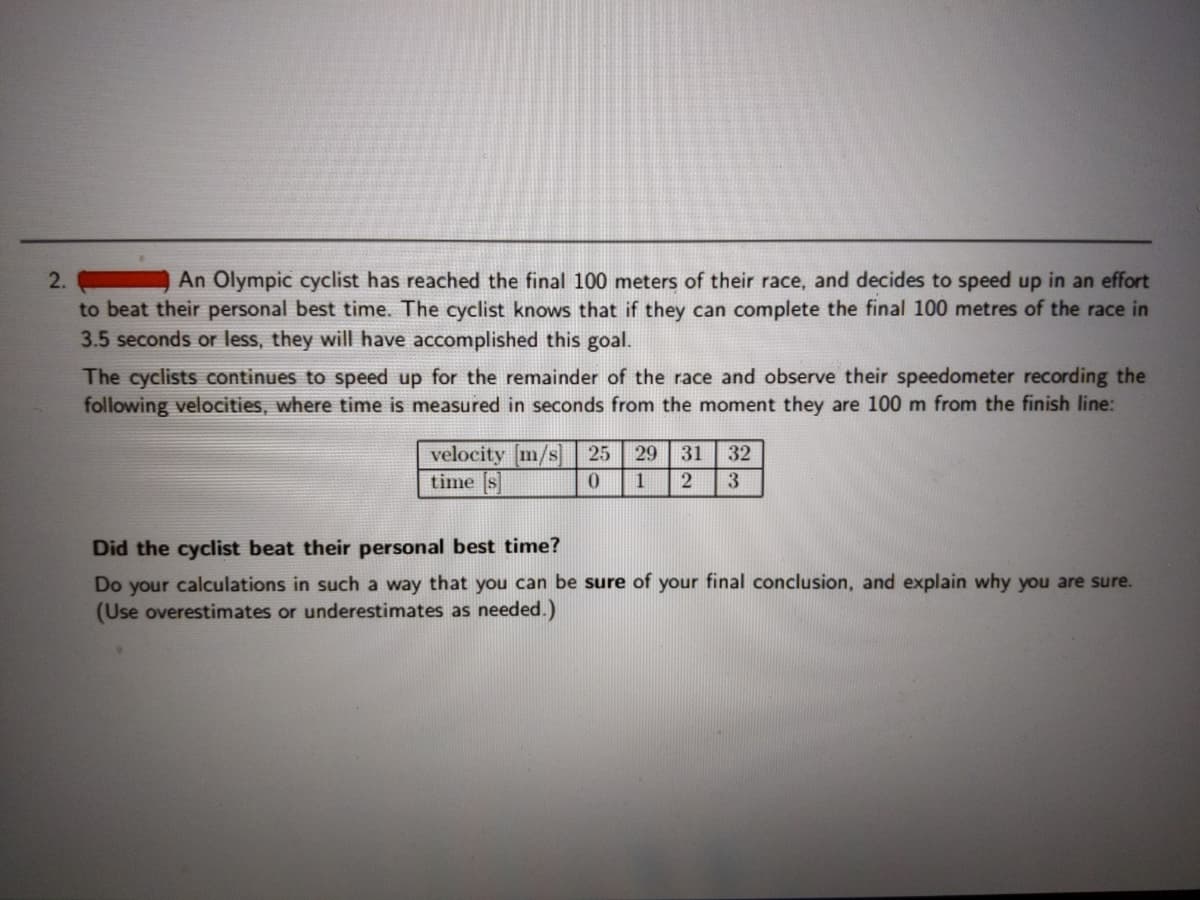An Olympic cyclist has reached the final 100 meters of their race, and decides to speed up in an effort to beat their personal best time. The cyclist knows that if they can complete the final 100 metres of the race in 3.5 seconds or less, they will have accomplished this goal. The cyclists continues to speed up for the remainder of the race and observe their speedometer recording the following velocities, where time is measured in seconds from the moment they are 100 m from the finish line: velocity (m/s] 25 29 31 32 time 1 2 3 Did the cyclist beat their personal best time? Do your calculations in such a way that you can be sure of your final conclusion, and explain why you are sure. (Use overestimates or underestimates as needed.)
An Olympic cyclist has reached the final 100 meters of their race, and decides to speed up in an effort to beat their personal best time. The cyclist knows that if they can complete the final 100 metres of the race in 3.5 seconds or less, they will have accomplished this goal. The cyclists continues to speed up for the remainder of the race and observe their speedometer recording the following velocities, where time is measured in seconds from the moment they are 100 m from the finish line: velocity (m/s] 25 29 31 32 time 1 2 3 Did the cyclist beat their personal best time? Do your calculations in such a way that you can be sure of your final conclusion, and explain why you are sure. (Use overestimates or underestimates as needed.)
Physics for Scientists and Engineers, Technology Update (No access codes included)
9th Edition
ISBN:9781305116399
Author:Raymond A. Serway, John W. Jewett
Publisher:Raymond A. Serway, John W. Jewett
Chapter2: Motion In One Dimension
Section: Chapter Questions
Problem 2.73AP: Kathy tests her new sports car by racing with Sian, an experienced racer. Both start from rest, but...
Related questions
Question
2

Transcribed Image Text:2.
An Olympic cyclist has reached the final 100 meters of their race, and decides to speed up in an effort
to beat their personal best time. The cyclist knows that if they can complete the final 100 metres of the race in
3.5 seconds or less, they will have accomplished this goal.
The cyclists continues to speed up for the remainder of the race and observe their speedometer recording the
following velocities, where time is measured in seconds from the moment they are 100 m from the finish line:
velocity m/s 25
time s
29
31
32
1
Did the cyclist beat their personal best time?
Do your calculations in such a way that you can be sure of your final conclusion, and explain why you are sure.
(Use overestimates or underestimates as needed.)
Expert Solution
This question has been solved!
Explore an expertly crafted, step-by-step solution for a thorough understanding of key concepts.
Step by step
Solved in 2 steps

Knowledge Booster
Learn more about
Need a deep-dive on the concept behind this application? Look no further. Learn more about this topic, physics and related others by exploring similar questions and additional content below.Recommended textbooks for you

Physics for Scientists and Engineers, Technology …
Physics
ISBN:
9781305116399
Author:
Raymond A. Serway, John W. Jewett
Publisher:
Cengage Learning

College Physics
Physics
ISBN:
9781938168000
Author:
Paul Peter Urone, Roger Hinrichs
Publisher:
OpenStax College

Physics for Scientists and Engineers, Technology …
Physics
ISBN:
9781305116399
Author:
Raymond A. Serway, John W. Jewett
Publisher:
Cengage Learning

College Physics
Physics
ISBN:
9781938168000
Author:
Paul Peter Urone, Roger Hinrichs
Publisher:
OpenStax College